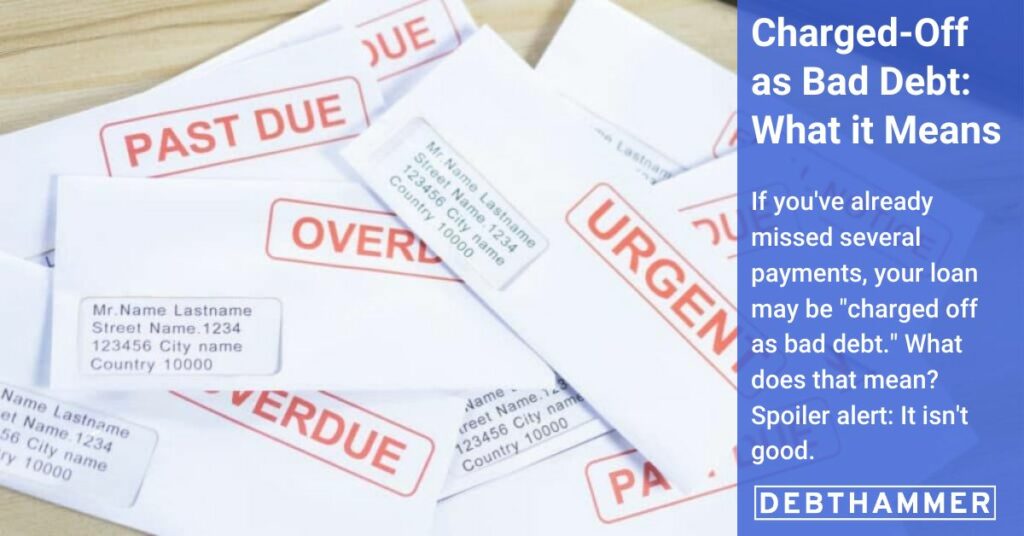If you’ve racked up several missed payments and are watching your credit card debt increase rapidly, you have more to worry about than your rising balance.
Your creditor may have the loan charged off as bad debt.
According to the Federal Reserve of St. Louis, this happens to about 2.25% of credit card debts in the U.S.
But what does that mean? Let’s take a look.
Table of Contents
Our take
- Charged off means your creditor has given up on getting repaid
- It doesn’t mean that you no longer owe the debt
- Charge-offs hurt your credit score substantially
- An account won’t be charged off unless it’s three to six months past due
- It’s very difficult to remove a legitimate charge from your credit report without paying, but there are a few steps you can try
What is a charge-off?
If you don’t make the minimum payments on your account for several months, your creditor will often write your debt off as “bad debt.” This means the creditor or lender has essentially given up hope that you’ll repay your outstanding debt and considers your loan uncollectible. The creditor will close your account, and your credit reports will be updated to note that the account was charged off. Your credit score will fall anywhere from 50 to 200 points.
It will usually appear on your credit report as “charged off as bad debt canceled by credit grantor.”
Pro tip: Confusion often arises when people see “canceled” on their credit reports. Charge-offs are not a form of loan forgiveness and does not mean your loan is canceled. You still technically owe the debt. It simply means that the lender has given up trying to get its money back.
Charged-off debt doesn’t mean that your debt has been forgiven. The charged-off debt will be reported to credit bureaus, which will have negative impact on credit history and scores.
Many types of debt can be charged off. These include:
- Personal loans
- Credit cards
- Student loans
- Revolving lines of credit
- Any other unsecured debt you’ve failed to repay
Pro tip: Secured debts like mortgages and auto loans won’t be charged off. Instead, the lender will begin taking steps to seize the asset that secures the loan. Charge-offs are bad, but losing your home or car would be far worse.
When creditors charge off your debt, they notify the three major credit reporting agencies (Experian, Equifax and TransUnion). The creditor may also sell the debt to a debt collection agency, to a debt buyer or may try to collect through its own in-house collections department. This means you’ll likely receive annoying and potentially aggressive calls from debt collectors.
Pro tip: A charge-off is one of the worst financial black marks that can appear on your credit report. It will significantly hurt your credit score and even though the creditor has written off the debt, you legally still owe the money.
A charge-off could also be noted on your credit report as a “profit and loss write-off.” This is simply another way of saying that the account was charged off as bad debt.
How many payments can you miss before an account is charged off?
The standard time for an account to be charged off is between 120 to 180 days so it should take anywhere from three to six months after your first missed payment.
You’ll have some warnings before the account is charged off
Charge-offs aren’t immediate. If you miss a payment or two, you don’t have to worry about it. First, your creditors will send payment reminders and letters reminding you that your bill is past-due. After that, they begin the collection process.
Pro tip: If you’re behind on your payments and are worried about an account being charged off, contact your creditor and ask about hardship programs. Be honest about your financial situation and tell them that bankruptcy may be your only option. If you file for bankruptcy, the creditor will walk away with nothing, so many are willing to work with you to prevent this.
You’re still legally obligated to repay charged-off accounts
Don’t think you no longer owe the debt just because it’s been marked as charged off. This does not mean the debt has been forgiven. It simply means the creditor believes you won’t fulfill your obligation to repay the money.
Unless you reach a settlement or file for bankruptcy, you remain responsible for repaying the debt until the statute of limitations on debt in your state is reached.
Charged-off accounts will hurt your credit score
Charged-off accounts affect your credit score because they indicate that you don’t fulfill your contractual obligations to repay money you’ve borrowed.
However, your credit score has likely already been damaged from the missed payments.
Payment history makes up 35% of your FICO score.
According to FICO, which has established one of the two major credit-scoring models, one late payment will cause your credit score to fall. Missing payments by 90 days or more could cause your score to fall by more than 100 points, depending on your current credit score.
Pro tip: If you already have bad credit, your score will fall less because you’re already starting from a lower point.
The damage the charge-off will cause to your credit score will depend on how low it already is. If you already have bad credit, it may only fall 50 points. If you have fair credit, it may fall up to 100 points. If you have good credit, your credit score could fall as much as 200 points.
How long does charged-off debt stay on your credit report?
Charged-off debts will remain on your credit report for seven years. That starts on the date of your first missed payment. The date will not restart if a debt is sold to a collection agency.
Pro tip: Paying the debt will not remove it from your credit report. However, the account’s status will be changed to note that the account has been paid or settled. Even though this stays on your credit report, it shows anyone viewing your credit report that you’ve made an effort to fulfill your obligation to repay the debt.
If you don’t take any steps to settle the debt, it will automatically fall off your credit report at the end of seven years. You should not need to take any additional steps unless it fails to disappear.
What to do if you have a charge-off
Sometimes, you can have an old debt you no longer remember. Federal law requires creditors and debt collectors to verify any unpaid debt in writing. This is called a debt validation letter and must be sent within five days of your initial contact. If you don’t automatically ask for one, even if you know the debt is legitimately yours.
The letter should include:
- How much you owe
- Your original creditor
- Instructions on how to contest the debt
- Once you get a debt validation letter, ask yourself:
- Is the debt actually yours?
- Have you repaid the debt?
- Is the debt past its statute of limitations?
Pro tip: If you have an account already charged off by a creditor, keep your other payments up to date before worrying about the charged-off debt. The damage to your credit score has already been done, and at that point, your priority should be to prevent additional debts from being charged off. Preventing more charge-offs will be better for your credit score than removing an already-established one.
READ MORE: Debt validation letters
Should you pay a debt that’s been charged off
To be honest, it depends. If the debt is legitimately yours, It’s probably worth contacting your creditor to make a settlement offer unless it is close to your state’s statute of limitations. However, the most important thing is to keep your other accounts current. That will be your best move if that means leaving the charge-off unpaid.
Pro tip: If you aren’t sure how to proceed, contact us at DebtHammer and set up a free consultation. Our team of experts will assess your situation and let you know your next best steps. There’s no commitment.
Once a debt is charged off, the notation remains on your credit report whether or not you repay the debt.
If you pay it, the notation will be changed to “paid charge off.” This may not immediately increase your credit score, but it will look better to lenders, potential employers or landlords who review your credit reports.
Pro tip: Make sure you check your state’s statutes of limitation. You do not want to risk resetting the clock on a debt that’s close to expiration just because a debt collector is pressuring you.
Disputing a charge off
If one of your accounts has been charged off and you believe it’s an error, there are some steps you can take to have it removed without paying. It will take a little bit of legwork on your part. This includes disputing it with the three major credit bureaus. You can also contact the creditor and offer to settle the debt for an amount that’s less than you owe.
What if the charge-off is legitimate?
There is no way for you to remove a legitimate charge-off from your credit report.
The only steps you can take are to pay it, settle it or convince your lender to remove it or change the charge-off status.
Occasionally, the creditor will agree to remove it if you call them and ask, but they will likely expect you to pay at least a portion of the debt in exchange for the removal. This is sometimes called pay-for-delete.
Pro tip: “Pay for delete” refers to when debt collectors offer to remove the collections account from your credit report. You must pay off at least a portion of the debt in exchange.
This is a legal gray area. Debt collectors are required by law to report accurate and complete information to the credit bureaus.
READ MORE: DIY debt settlement
More debt relief options
The best way to protect your credit score is to avoid the charge-off in the first place.
Act as soon as you’re having problems making payments, particularly if your credit score is still good:
- Contact your original creditor or credit card issuer
- Apply for a debt consolidation loan and use the loan proceeds to pay your original lender.
- Talk to a debt settlement company
- Debt Management Plan
READ MORE: How does debt settlement work?
Don’t ignore it
Whichever option you choose, it’s essential to take action quickly. Once the debt is charged off, it will significantly hurt your credit score, and removing the charge is complicated.
The bottom line
The worst thing you can do is ignore an unpaid debt. It won’t go away, and it will make it harder to get credit cards, car loans or even buy a house.
If you’re behind on your payments, contact your creditor immediately. They may be willing to work with you.
If you’re confused about what’s happening or need some advice, DebtHammer can help. Schedule a free consultation now.


